That success was still relatively low-key at the end of 1978, when the band – by now featuring ever-present guitarist Dave Murray and vocalist Paul Di’Anno – recorded their first demo at Spaceward Studios in Cambridge. They did it on New Year’s Eve because it was cheaper, and laid down four songs. Three of these (Prowler, Strange World and Iron Maiden itself) would end up on their self-titled debut.
Before that, they played it to London DJ Neal Kay, whose rock club the Bandwagon Heavy Metal Soundhouse was a focal point of the NWOBHM scene. He began playing the tape and publicising it in the Bandwagon Soundhouse charts that ran in Sounds at the time. The publicity helped them get gigs further afield, and they traversed the country in an old truck known as the Green Goddess. When they released a three-track version of the demo as their debut EP under the name The Soundhouse Tapes, all 5,000 copies sold out.
Maiden’s star was on the rise – but they still needed a full album to keep it that way.
Step forward now-legendary manager Rod Smallwood, who negotiated a three-album deal with major label EMI. The band entered London’s Kingsway Studios in January 1980 to record the first, but the sessions didn’t go well. They were forced to dismiss two producers and claim that they ended up virtually self-producing their debut anyway when the third, Will Malone, showed little interest in it.
The result was a flawed LP that nevertheless showcased many of the band’s qualities. There were those propulsive bass-runs, melodic leads and sudden time-changes, while Paul Di’Anno’s rasping delivery, perhaps ironically, was frequently described as adding a punk edge. And despite the somewhat flat production, the songs themselves had a sense of raw unfettered energy the band have never quite managed to repeat.
